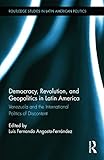Democracy, revolution and geopolitics in Latin America : Venezuela and the international politics of discontent / edited by Luis Fernando Angosto-Ferrández.
Material type: TextSeries: Routledge studies in Latin American politicsPublication details: New York : Routledge, Taylor & Francis Group 2014Description: xix, 201 p ; 24 cmISBN:
TextSeries: Routledge studies in Latin American politicsPublication details: New York : Routledge, Taylor & Francis Group 2014Description: xix, 201 p ; 24 cmISBN: - 9780415705011 (hardback)
- 9781315890111 (ebk)
- 327.8708
- JL 966 D383 2014
| Item type | Current library | Home library | Collection | Shelving location | Call number | Vol info | Copy number | Status | Date due | Barcode |
|---|---|---|---|---|---|---|---|---|---|---|
 Libro
Libro
|
Biblioteca Juan Bosch | Biblioteca Juan Bosch | Ciencias Sociales | Ciencias Sociales (3er. Piso) | JL 966 D383 2014 (Browse shelf(Opens below)) | 1 | 1 | Available | 00000113758 |
"Hugo Chavez won re-election in the 2012 Venezuelan presidential election, despite a closer margin between candidates than in previous elections. The results were puzzling for those who believed that Chavezs government had long ago reached its limits, while Chavezs supporters were struck by the growth of the opposition vote. Thus understanding the Venezuelan election of 2012 has proved to be challenging, with various recent studies focused upon it. Luis F. Angosto Ferrandezs book advances two ideas not previously discussed: the relationship between electoral behavior in Venezuela and contemporary Latin American geopolitics, and the way that relationship is projected through the candidates appeal to narratives that situate Venezuela at the core of a heroic Latin American tradition and of a new regional process of integration.This edited volume first contextualizes and explains the results of the last re-election of Hugo Chavez in terms of its geopolitical conditionings and implications. Contributors tackle Latin American geopolitics by analyzing Venezuelan foreign policy and the countrys role in continental projects of supra-national integration. Contributors also examine electoral strategy and tactics in order to show how the two main candidates built their campaign on emotional grounds as much on rational ones. This will be connected to the investigation of new narratives of national identification in contemporary Venezuela and how they may have practical implications in the design of policies addressing issues such as indigenous rights, community media and national security.Compiling state-of-the-art research on Latin American and Venezuelan politics, this book will appeal to academics and professionals who specialize in Latin American studies, international relations, democracy, and indigenous peoples"-- Provided by publisher.
"Hugo Chz won re-election in the 2012 Venezuelan presidential election, despite a closer margin between candidates than in previous elections. The results were puzzling for those who believed that Chzs government had long ago reached its limits, while Chzs supporters were struck by the growth of the opposition vote. Thus understanding the Venezuelan election of 2012 has proved to be challenging, with various recent studies focused upon it. Luis F. Angosto Ferrez's book advances two ideas not previously discussed: the relationship between electoral behavior in Venezuela and contemporary Latin American geopolitics, and the way that relationship is projected through the candidates appeal to narratives that situate Venezuela at the core of a heroic Latin American tradition and of a new regional process of integration. This edited volume first contextualizes and explains the results of the last re-election of Hugo Chz in terms of its geopolitical conditionings and implications. Contributors tackle Latin American geopolitics by analyzing Venezuelan foreign policy and the country's role in continental projects of supra-national integration. Contributors also examine electoral strategy and tactics in order to show how the two main candidates built their campaign on emotional grounds as much on rational ones. This will be connected to the investigation of new narratives of national identification in contemporary Venezuela and how they may have practical implications in the design of policies addressing issues such as indigenous rights, community media and national security"-- Provided by publisher.


There are no comments on this title.